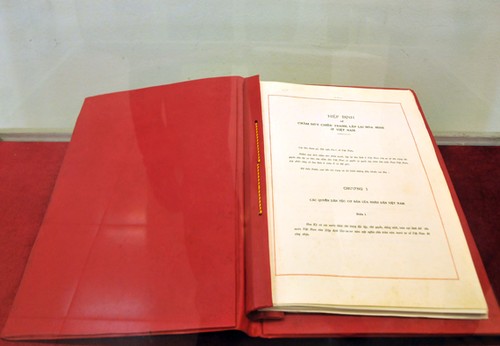(VOVworld)- 41 years ago, the Paris Peace Accord was signed ending the war, restoring peace to Vietnam and marking a historic milestone in the Vietnamese people’s revolution. The agreement was clear evidence that “justice wins over brutality, humanity replaces cruelty” and strengthened the confidence of oppressed nations in their just struggles.
The 1973 Paris Peace Accord was signed after more than 4 years and 8 months of negotiations. It was signed in Paris by the governments of the Democratic Republic of Vietnam, the Vietnam Southern Liberation Front (which later became the Provisional Revolutionary Government of the Republic of Southern Vietnam), the Republic of Vietnam and the US.
Strengthening confidence in just struggles
The signing of the Paris agreement ended Vietnam’s longest and most difficult war in the 20th century and marked a historic victory by the Vietnamese people after more than 19 years of fighting on the political, military and diplomatic front against American invaders. All the fights on the battlefields and at the negotiation tables were aimed at forcing the US to end the war in Vietnam and respect Vietnam’s independence, sovereignty, and territorial integrity.

1973 Paris Peace Accord
|
Following the signing of the Paris agreement, the US stopped bombing northern Vietnam and withdrew its troops from southern Vietnam. The Vietnamese people had defeated the US aggressors and paved the way for overthrowing its puppet regime. This victory was due to the extraordinary efforts, strong will and staunch spirit of the Vietnamese people and army under the leadership of the Communist Party of Vietnam. The Party mapped out the strategy for the anti-US war of resistance and devised creative, independent and effective external policies. Vietnam managed to set up an anti-US front supported by international friends. Madam Nguyen Thi Binh is former Vice President, and Head of the negotiation delegation of the Provisional Revolutionary Government of the Republic of Southern Vietnam: “The agreement was thanks to the contributions by Vietnamese soldiers and civilians for more than 20 years. Many Vietnamese laid down their lives. We all know that there would be no Paris Agreement without the Mau Than Uprising in 1968, the liberation of Quang Tri and the 81-day long struggle in the ancient citadel, the Dien Bien Phu-in-the-air campaign and the strong northern rear. And of course, there would not had been the Unification Victory in Spring 1975 without the Paris Agreement”.
Strong impetus for Vietnam’s international integration
By signing the Accord, the US agreed to end its active military involvement in the war in Vietnam and withdraw its troops from Vietnam and Indochina, thus weakening the Saigon puppet regime. The agreement opened a new era and created favorable conditions for the liberation of the south and national reunification in 1975.
The Paris Conference and the 1973 Paris Peace Accord created significant lessons for Vietnam’s current developments, lessons that are now being used by Vietnam to sustainably integrate into the world and consolidate its relations with other countries. President Truong Tan Sang said: “First of all, it is a lesson about the Party leadership in bringing into play the strength of diplomacy and combining diplomacy with politics and military and other fronts to create a combined strength to win a complete victory. We also learned a lesson about the importance of being persistent to an external policy of independence and self-reliance for national interests, following President Ho Chi Minh’s diplomatic motto of “Using stability to respond to instability”, creating opportunities to get the enemy involved in negotiation, organizing diplomatic attacks and ending the negotiation when possible. The lesson was also about the importance of harmoniously dealing with relations between major countries and gaining international support.
41 years have passed, but the values of the Paris Conference and the Paris Peace Accord remain significant for Vietnam’s national construction and defense and represent Vietnam’s will and wisdom.